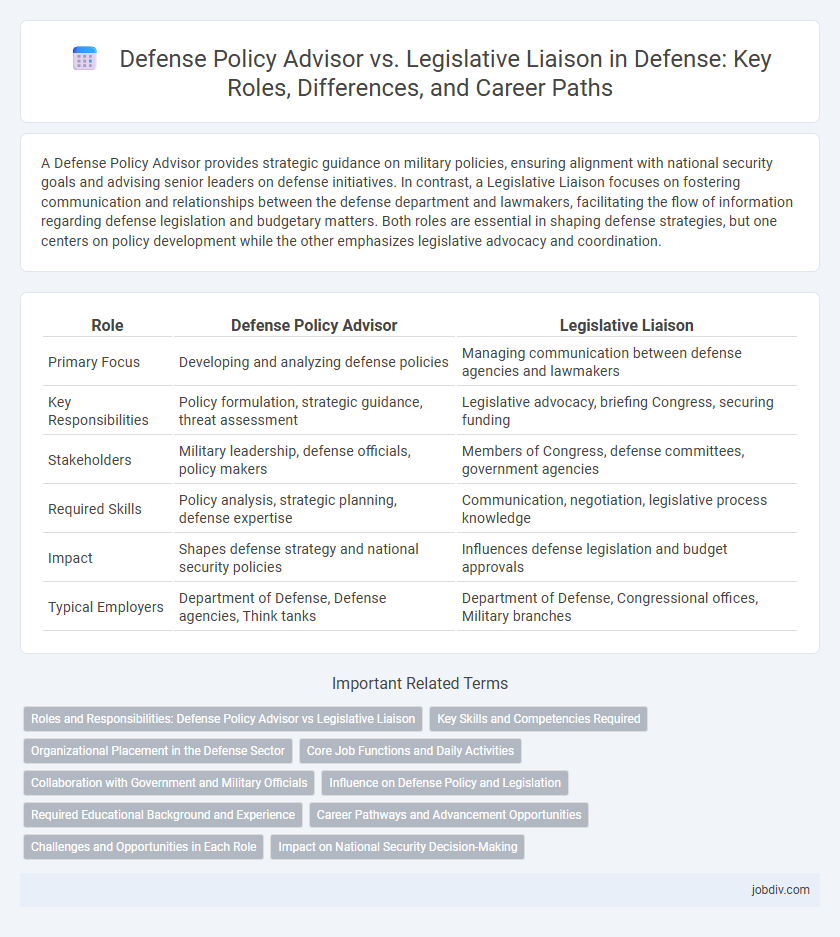A Defense Policy Advisor provides strategic guidance on military policies, ensuring alignment with national security goals and advising senior leaders on defense initiatives. In contrast, a Legislative Liaison focuses on fostering communication and relationships between the defense department and lawmakers, facilitating the flow of information regarding defense legislation and budgetary matters. Both roles are essential in shaping defense strategies, but one centers on policy development while the other emphasizes legislative advocacy and coordination.
Table of Comparison
| Role | Defense Policy Advisor | Legislative Liaison |
|---|---|---|
| Primary Focus | Developing and analyzing defense policies | Managing communication between defense agencies and lawmakers |
| Key Responsibilities | Policy formulation, strategic guidance, threat assessment | Legislative advocacy, briefing Congress, securing funding |
| Stakeholders | Military leadership, defense officials, policy makers | Members of Congress, defense committees, government agencies |
| Required Skills | Policy analysis, strategic planning, defense expertise | Communication, negotiation, legislative process knowledge |
| Impact | Shapes defense strategy and national security policies | Influences defense legislation and budget approvals |
| Typical Employers | Department of Defense, Defense agencies, Think tanks | Department of Defense, Congressional offices, Military branches |
Roles and Responsibilities: Defense Policy Advisor vs Legislative Liaison
Defense Policy Advisors develop strategic frameworks and analyze military doctrines to guide national security decisions, ensuring alignment with overarching defense objectives. Legislative Liaisons facilitate communication between the Department of Defense and Congress, managing legislative affairs, tracking defense bills, and advocating for policy priorities. Both roles demand expertise in defense policy but differ with the advisor focused on strategy and analysis, while the liaison emphasizes legislative engagement and congressional relations.
Key Skills and Competencies Required
Defense Policy Advisors require strong analytical skills, expertise in national security strategy, and the ability to interpret complex military regulations and geopolitical developments. Legislative Liaisons must excel in communication, negotiation, and relationship-building to effectively coordinate between defense agencies and lawmakers. Both roles demand deep knowledge of defense policies, but the advisor emphasizes strategic analysis while the liaison focuses on advocacy and legislative processes.
Organizational Placement in the Defense Sector
A Defense Policy Advisor typically operates within the strategic planning divisions of the Department of Defense or military services, influencing policy formulation and high-level decision-making processes. In contrast, a Legislative Liaison is embedded in the governmental affairs or public affairs offices, facilitating communication and coordination between the defense organization and congressional committees or legislative bodies. Organizational placement reflects their primary function: policy advisors shape defense strategy internally, while legislative liaisons manage external relationships and advocacy to secure funding and legislative support.
Core Job Functions and Daily Activities
A Defense Policy Advisor primarily conducts strategic analysis, formulates defense policies, and provides expert recommendations to military leaders and government officials. In contrast, a Legislative Liaison facilitates communication between the defense department and legislative bodies, coordinating briefings, tracking legislation, and ensuring compliance with congressional requirements. Both roles require in-depth knowledge of defense regulations, but the advisor emphasizes policy development while the liaison focuses on legislative advocacy and stakeholder engagement.
Collaboration with Government and Military Officials
The Defense Policy Advisor strategically collaborates with senior military leaders and government officials to shape defense strategies and ensure policy alignment with national security goals. The Legislative Liaison specializes in facilitating communication between the Department of Defense and congressional members, advocating for defense priorities and securing legislative support. Both roles require seamless coordination to integrate military objectives with legislative agendas, strengthening defense initiatives at the federal level.
Influence on Defense Policy and Legislation
A Defense Policy Advisor directly shapes defense strategy by providing expert analysis and recommendations to senior military and government leaders, ensuring policy aligns with national security objectives. In contrast, a Legislative Liaison acts as the critical communication bridge between the defense establishment and lawmakers, facilitating the passage of defense-related legislation and securing support for defense initiatives. Both roles are pivotal in influencing defense policy, with the advisor driving policy formulation and the liaison ensuring legislative backing.
Required Educational Background and Experience
A Defense Policy Advisor typically requires a graduate degree in political science, international relations, or national security, coupled with extensive experience in defense strategy, policy analysis, and interagency coordination. In contrast, a Legislative Liaison often needs a bachelor's degree in political science, public administration, or a related field, along with hands-on experience in legislative processes, government relations, and communication with congressional offices. Both roles demand a strong understanding of defense policies and government operations, but the Defense Policy Advisor focuses more on strategic policy formulation while the Legislative Liaison emphasizes legislative advocacy and stakeholder engagement.
Career Pathways and Advancement Opportunities
Defense policy advisors typically advance through roles that emphasize strategic analysis and interagency collaboration, gaining expertise in national security policy formulation and implementation. Legislative liaisons progress by building strong relationships with members of Congress and understanding legislative processes, often moving into senior government affairs or public affairs positions. Both career pathways offer advancement opportunities in defense agencies, with policy advisors focusing on high-level policy development and legislative liaisons excelling in advocacy and communication roles.
Challenges and Opportunities in Each Role
Defense Policy Advisors confront the challenge of balancing strategic military objectives with evolving geopolitical threats, requiring deep expertise in international security and defense regulations. Legislative Liaisons face the opportunity to influence defense funding and policy by building strong relationships with lawmakers and translating complex military needs into actionable legislative language. Both roles demand adaptability to shifting political landscapes, but Policy Advisors emphasize strategic foresight while Legislative Liaisons prioritize persuasive communication and policy advocacy.
Impact on National Security Decision-Making
Defense Policy Advisors shape strategic priorities by analyzing security threats and recommending policy adjustments that influence national defense frameworks. Legislative Liaisons bridge communication between military leadership and lawmakers, ensuring legislative support and resource allocation for defense initiatives. Their combined roles enhance national security decision-making through informed policy development and effective legislative advocacy.
Defense Policy Advisor vs Legislative Liaison Infographic

 jobdiv.com
jobdiv.com